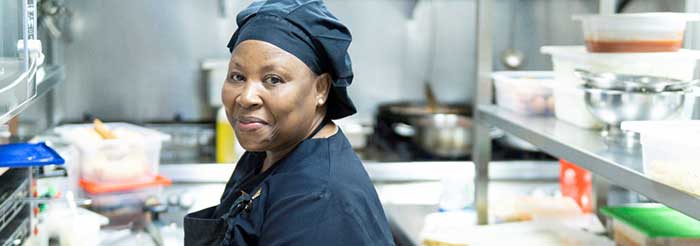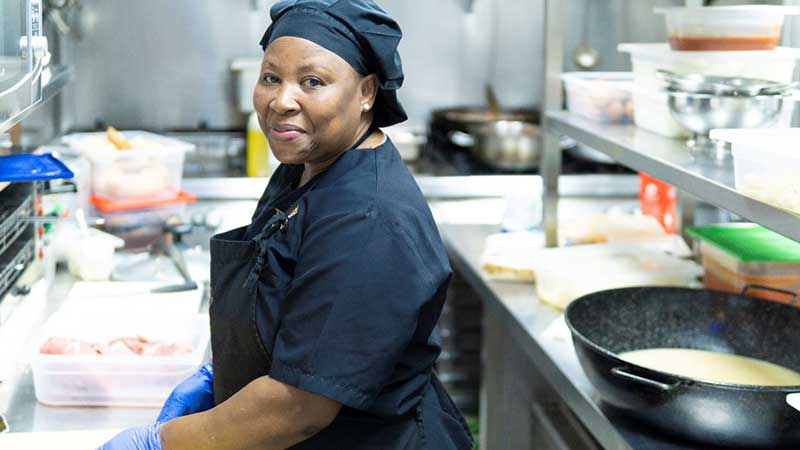By Haley Glover and Julie Johnson

How do restaurant apprenticeship programs survive a pandemic? With help and strong partnerships.
That’s true of the innovative restaurant manager and line cook registered apprenticeship programs created by the National Restaurant Association Educational Foundation (NRAEF). In February 2020, the line cook apprenticeship had just launched and the restaurant manager apprenticeship had expanded to 70 restaurant and hospitality employer partners and more than 2,000 apprentices. Both programs sought to serve adults, opportunity youth, and high school students, with a focus on underserved Hispanic and Black populations.
A priority was ensuring these programs put students on solid career paths by counting their training – 144 hours in-person or online, plus on-the-job training – toward post-high school credentials. “Apprenticeship is a successful non-institutional learning strategy to improve education and employment opportunities,” said Caroline Eckert, manager of program development at NRAEF. These programs are part of Lumina Foundation’s All Learning Counts (ALC) Initiative. All Learning Counts paves new paths to learning and works to ensure that all quality learning and training count.
Then the pandemic hit early this spring. Restaurants were severely affected. The apprenticeship programs were put on hold. NRAEF quickly set up the Restaurant Employee Relief Fund for restaurant workers who lost their jobs or faced reduced work hours. NRAEF raised $21.5 million to disperse $500 grants to 43,000 impacted workers.
Many restaurant workers had to move from salaried to hourly pay. Some were initially furloughed and then returned to their apprenticeships. For most, the nature of their work dramatically changed as restaurants transitioned from sit-down dining to takeout and delivery.
As some have left their jobs over COVID-19 safety concerns, others have been finding work. The need for cooks, managers, and other employees is high; July data from Burning Glass showed 100,000 job openings nationally in the restaurant industry. The pandemic “is a calamity for the industry, no doubt,” said John Shortt, director of program development at NRAEF. “However, the impact on the apprenticeship programs is not as bad as we expected it to be.”
Despite the disruptions, restaurant partners remain committed to the apprenticeship programs. But many are not currently able to offer the full complement of competency-based training and experience. So NRAEF stepped up again, working with the U.S. Department of Labor, to cover the cost of online training for current and future apprentices.
Back on track, adding new partners
NRAEF fully expects its apprenticeship programs to get back on track, though the timing for completion may change. It has broadened its scope to include new partners, such as Job Corps and YouthBuild, and is exploring additional apprenticeships in areas that will be critical to our economic recovery.
NRAEF also is building ties with post-high school education partners across the nation. They’ve established credit-based programs with colleges and universities in California, Texas, Florida, Tennessee, Maryland, and Louisiana that help apprentices earn up to 18 credits toward a hospitality or culinary arts degree.
As far as advice to others offering apprenticeship programs in these difficult times, Shortt says, “Don’t just build credentials, develop a career pathway.” Adds Sue Crystal-Mansour, NRAEF vice president of program impact, “Know your target audience, what barriers they will encounter, and how to address those barriers. Recognize who you are leaving behind in your program and what can be done to fix that.”
Julie Johnson is the founder and principal of StrategyForward Advisors, a higher education policy and strategy consultancy in Washington D.C. She is Lumina Foundation’s project consultant for All Learning Counts.
Haley Glover is a strategy director at Lumina Foundation, leading mobilization strategies focused on communities and institutions of higher education. Our thanks to Caroline Eckert, John Shortt and Susan Crystal-Mansour for their contributions to this project and this article.
